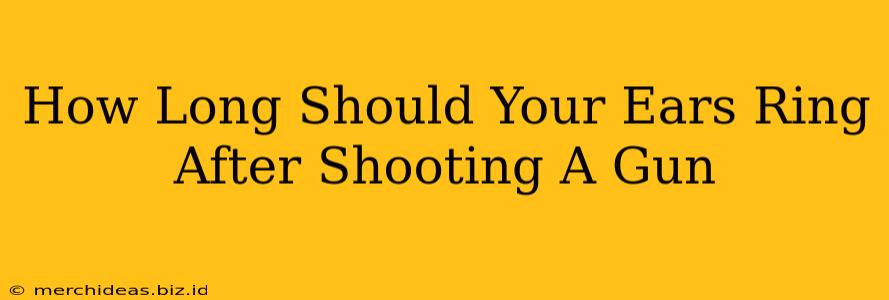How Long Should Your Ears Ring After Shooting a Gun? Understanding Hearing Safety
Shooting guns can be a fun and exciting activity, but it's crucial to prioritize your hearing health. The loud noises associated with firearms can cause temporary or permanent hearing damage if proper precautions aren't taken. One common question among shooters is: how long should your ears ring after shooting a gun? The answer isn't straightforward, and understanding the nuances is key to protecting your hearing.
Understanding Temporary Threshold Shift (TTS)
The ringing you experience after shooting, often called tinnitus, is usually a sign of Temporary Threshold Shift (TTS). This is a temporary reduction in your hearing sensitivity. TTS is relatively common after exposure to loud noises, and it's typically nothing to be overly concerned about provided it's temporary. The key is the duration. A slight ringing that fades within a few hours is generally considered normal after exposure to gunfire. However, a prolonged or intense ringing warrants immediate attention.
How Long is Too Long?
There's no magic number of hours or minutes to define "too long." The crucial factor is the severity and persistence of the ringing. If your ears are still ringing significantly:
- After several hours: This suggests a more substantial TTS and indicates that you may have experienced a higher level of noise exposure than is ideal.
- For more than a day: This is a strong indicator that you may have suffered some degree of permanent hearing damage. You should seek medical advice immediately.
- With associated pain or dizziness: These symptoms require immediate medical attention. They could signal a more serious problem than simple TTS.
Factors Affecting Ringing Duration
Several factors influence how long your ears ring after shooting:
- Type of firearm: Larger caliber weapons produce significantly louder reports than smaller ones.
- Distance from the firearm: Being closer to the muzzle significantly increases noise exposure.
- Hearing protection: The use of proper hearing protection, such as earplugs or muffs, dramatically reduces the risk of TTS and hearing damage. Always wear hearing protection when shooting.
- Environmental factors: Shooting outdoors can slightly reduce the impact compared to an enclosed range, but proper hearing protection is still crucial.
- Individual sensitivity: Some people are more susceptible to noise-induced hearing loss than others.
Preventing Hearing Damage
Preventing hearing damage is far better than trying to treat it. Here are crucial steps to protect your hearing while shooting:
- Always wear hearing protection: Invest in high-quality earplugs or muffs rated for firearm noise reduction.
- Use proper shooting techniques: Ensure that you maintain a safe distance from the muzzle.
- Take breaks: Avoid prolonged exposure to gunfire.
- Schedule regular hearing checks: Consult an audiologist for routine hearing tests, especially if you're a frequent shooter.
In summary: A slight ringing that subsides within a few hours after shooting is usually benign. However, any persistent or severe ringing, especially accompanied by pain or dizziness, requires immediate medical attention. Prioritizing hearing safety by consistently using hearing protection is the most effective way to prevent long-term hearing problems. Don't take your hearing for granted—it's a precious sense.
